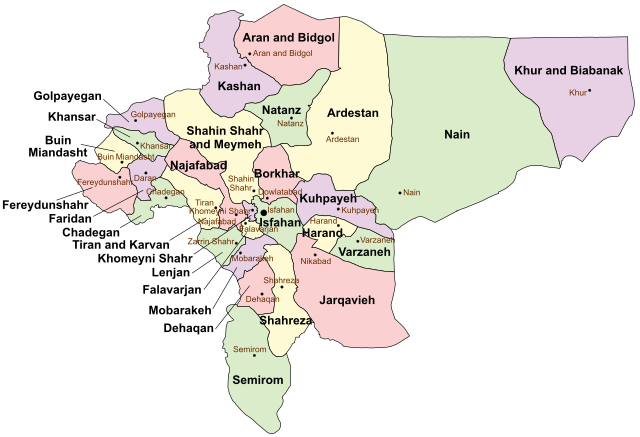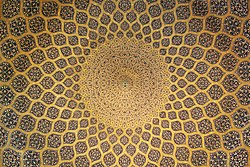Top Qs
Timeline
Chat
Perspective
Isfahan province
Province of Iran From Wikipedia, the free encyclopedia
Remove ads
Isfahan or Esfahan/Espahan province (Persian: استان اصفهان)[a] is one of the 31 provinces of Iran. Its capital is the city of Isfahan.[5]
Remove ads
The province is in the center of the country in Iran's Region 2,[6] whose secretariat is located in Isfahan.
Remove ads
History
Historians have recorded Espahan, Sepahan or Isfahan initially as a defense and military base. The security and protection of the gradually increasing castles and fortifications, thereby, would provide the protection of residents nearby, therefore leading to the growth of large settlements nearby. These historical castles were Atashgah, Sarooyieh, Tabarok, Kohan Dej, and Gard Dej. The oldest of these is Ghal'eh Sefeed and the grounds at Tamijan from prehistoric times. The historic village of Abyaneh, a nationwide attraction, also has Sasanian ruins and fire temples among other historical relics.
During the 17th and 18th centuries, Isfahan province enjoyed high standards of prosperity as it became the capital of Safavid Iran. While the city of Sepahan (Esfahan) was their seat of monarchical, Kashan was their place of vacation and leisure.
Remove ads
Demographics
Summarize
Perspective
Language
First language in Isfahan province[7]
A majority of the population speak Persian as first language with a minority of Luri, Turkic, Georgian, Biyabanaki and Armenian speakers.[7]
During the Pahlavi era, a large group of Kurds from the Gulbaghi tribe were moved from the north of Kurdistan province to the city of Isfahan and the cities of Yazd, Kashan, and Nayin. Today, the Gulbaghi tribe are mostly assimilated elements in the population of these cities.[8][9]
Population
At the time of the 2006 National Census, the province's population was 4,499,327 in 1,223,684 households, with a literacy rate of 88.65 percent.[10] The following census in 2011 counted 4,879,312 people in 1,454,162 households.[11] The 2016 census measured the population of the province as 5,120,850 in 1,607,482 households.[2]
Administrative divisions
The population history and structural changes of Isfahan province's administrative divisions over three consecutive censuses are shown in the following table.
Cities
According to the 2016 census, 4,507,430 people (over 88% of the population of Isfahan province) live in the following cities:[2]
Remove ads
Geography
Summarize
Perspective
The Isfahan province covers an area of approximately 107,018 square km and is situated in the center of Iran. To its north, stand the Markazi (Central) Province and the provinces of Qom and Semnan. To its south, it is bordered by the provinces of Fars, and Kohgiluyeh and Boyer-Ahmad province. Aminabad is the most southern city of Isfahan province just 2 km north of the border. To the east, it is bordered by the province of Yazd. To the west, it shares its border with the province of Lurestan and to the southwest lies the province of Chahar Mahal and Bakhtiyari.
The province experiences a moderate and dry climate on the whole, ranging between 40.6 °C (105.08 °F) and 10.6 °C (51 °F) on a cold day in the winter season. The average annual temperature has been recorded as 16.7 °C (62 °F) and the annual rainfall on average has been reported as 116.9 mm. The city of Sepahan (Esfahan) however experiences an excellent climate, with four distinct seasons.
With an elevation of 4,040 metres, the Shahankuh is the highest peak in Isfahan province. This mountain is located about 20 kilometres southwest of the city of Fereydunshahr in the western part of the province.
Isfahan province has 52 rivers, mostly small and temporary, with the exception of the Zāyanderud, which totals 405 km in length a basin area of 27,100 km2.[19]
Biodiversity
Esmaeilius isfahanensis (Farsi: کپوردندان_اصفهان) is a species of Cyprinodontid fish endemic to the Zayandehrud river basin (see genus Esmaeilius). It is known only from three sites across the province.[20][21][22][23] Allium chlorotepalum is an endemic species of Isfahan province, Astragalus vernaculus is also common in the west of the province.[24][25]
Modern economy
Nine tons of saffron are produced by this province by the year.[26]
It is the biggest milk and dairy producer in Iran.[27]
High tech
The state has 18k active fiber optically connected network ports as of mid 2023.[28]
Military
Iranian armed forces and the Islamic Republic military has several locations inside Isfahan province, There is also Esfahan nuclear fuel research and production center nfrpc. Hesa specializes in aerospace and helicopter maintenance and weaponry.[29][30][31]
Tourism
Bridges
Main Isfahan attractions include
- Shahrestan bridge
- Khajoo (Khaju) Bridge in Isfahan
- siosepol or Si-O-Se-Pol bridge
- Choobi Bridge (Joubi Bridge)[32]
Remove ads
Cuisine
According to the Isfahan atlas[who?], well-known local dishes include Shefte, Kachi, Kebab Golpayegan, Samanu Shahreza, Carrot stew Khansar, Yokhe bread (Kaak) and Semirom.[33][34]
Education
As of 2023, fifty thousand foreigners were studying in schools in Isfahan province.[35]
Public universities
Islamic Azad Universities
Several well-known Islamic Azad University campuses in Iran are located in the province:
- Islamic Azad University of Falavarjan[36]
- Islamic Azad University of Meymeh
- Islamic Azad University of Kashan
- Islamic Azad University of Majlesi
- Islamic Azad University of Shahreza
- Islamic Azad University of Najafabad
- Islamic Azad University of Khomeynishahr
- Islamic Azad University of Isfahan[37]
- Islamic Azad University of Khorasgan[38]


Remove ads
Gallery
- The Dome of Shah Mosque, Isfahan
- Kashan is another cultural jewel of the province. Seen here is the Agha Bozorg Mosque.
- Ceiling in the Ali Qapu Palace, Isfahan
- The dome of Sheikh Lotfollah Mosque, Isfahan
- Vank Cathedral, Isfahan
See also
- Georgians in Iran
- History of Iran
- List of the historical structures in the Isfahan province
- List of cities in Isfahan Province by population
- Ostandari Isfahan
![]() Media related to Isfahan Province at Wikimedia Commons
Media related to Isfahan Province at Wikimedia Commons
Notes
- Also romanized as Ostān-e Esfahān, Esfahan, Espahan, or Isphahan
- Separated from Borkhar and Meymeh County after the 2006 census[12]
- Separated from Faridan County after the 2011 census[13]
- Separated from Isfahan County after the 2016 census[14]
- Separated from Isfahan County after the 2016 census[15]
- Separated from Nain County after the 2006 census[16]
- Separated from Isfahan County after the 2016 census[17]
- Separated from Shahinshahr and Meymeh County after the 2016 census[18]
- Formerly Borkhar and Meymeh County[12] and then Shahinshahr and Meymeh County[18]
References
Bibliography
Further reading
External links
Wikiwand - on
Seamless Wikipedia browsing. On steroids.
Remove ads









